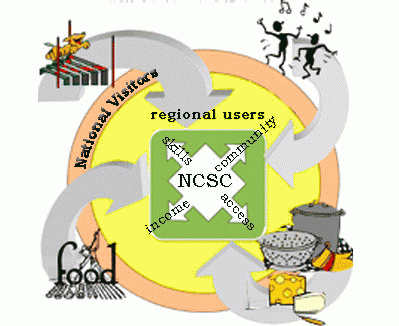If a person wanted to learn to cook they took the "culinary track" at the local vocational school. If someone wanted to build, they took the "contractor's track," or the electrician, or the mason. This separation of trades and skills from basic education built a different economy; one where the trades were ignored in favor of college preparation. It also meant college-bound students were left to fend for themselves in learning how to shop, cook, repair, or even purchase. Quality gave way to quantity, and care gave way to "shopping therapy." As a result we are now left without a public that doesn't know how to judge good investments from bad, healthy food from not-so-healthy food, or even how to take care of themselves in case of emergency.
Schools used to go to on field trips to learn how their food was cared for prior to purchasing it. Now they go so they can get free samples, a tour for career education, or perhaps, in the case of "life skills classes," they are taught how to judge ripe from unripe fruit, moldy from non-moldy, and other basic choices. Those developmentally challenged students are taught how to make change, how to write a check, or how to balance their diet. Are "normal kids" taught those things?
When my son was in school I asked his principal when they taught basic food education in his charter school. This school had a great deal of wonderful opportunities for my son, but the principal's answer was "That's your job. We can't do everything." I was a bit shocked but then I asked him, "My son has a mother at home who has that knowledge. But what about the kids who has one parent at home, or both parents work, and they only know how to read a microwaveable food box? What do they do?" He didn't have an answer for that, but we have to find one.
This is a fundamental part of sustainability. If people don't know what goes into their food, they can't protect it, or make informed choices about which foods to use. If they rely on prepared food they are putting unnecessary chemicals into their bodies, and not knowing it.
Whole food is completely biodegradable. It comes without wrappers, boxes or directions that need to be discarded. Eating food that comes from within your own foodshed minimizes the amount of gasoline spent, carbon added to the atmosphere, and allows different types of foods to be available because they don't need to be shipped and retain their "pizzazz" appeal.
Learning how to sew promotes creativity, critical thinking, and reinforces reading, interpretation, and following directions. It also can lead to careers in fashion, tailoring, education, or just a well-stocked closet. Basic carpentry, plumbing, and an understanding of electricity can save money whether doing the work yourself, or supervising the contractor to make sure their work makes sense.
More than basic "home economics," locking our children into classrooms with their computers and their learning tools has taken away some of the early lessons that we once learned at home. The cause-and-effect of kindness or cruelty, a safe trip across a pasture, or a kick that sent a child airborn. The wisdom of dressing appropriately because dressing for a heated classroom doesn't take into account a bus breakdown, a furnace failure, or a delay in
the opening of a door.
While we have tried to do best by our children to make their lives easier, we have inadvertently made those lives more difficult. Putting fashion over function, price over quality, and convenience over wisdom, has a chilling effect on their future. We need to address these issues now, while we still have teachers around, like grandparents and rural folk, who can address these deficiencies, and make the world more secure in the future.
Join the movement to "Revive" these lost skills, community, oral tradition, and more by building sustainability at home and through The Hearth at NCSC. Please give what you can, share this blog with others and help us put our young people back on a more self-reliant track.





